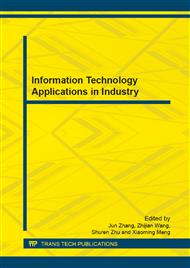p.3163
p.3168
p.3174
p.3177
p.3184
p.3188
p.3194
p.3198
p.3203
Simulation of Tacit Knowledge Sharing among Organizations Using a Cellular Automaton Model
Abstract:
Knowledge entities can be divided into egoists and altruists based on the various behaviors of tacit knowledge entities out of bounded rationality in the knowledge sharing process. Focusing on the evolvement of tacit knowledge entities’ sharing behavior among organizations, this paper chose knowledge sharing benefits and knowledge sharing costs as control parameters, and a tacit knowledge sharing model based on Cellular Automaton was proposed. Effects of the two control parameters on knowledge sharing behaviors and strategies were simulated with NetLogo, a professional simulation software, and related suggestions were put forward based on the results, which would enhance the tacit knowledge sharing among organizations.
Info:
Periodical:
Pages:
3184-3187
Citation:
Online since:
December 2012
Authors:
Price:
Сopyright:
© 2013 Trans Tech Publications Ltd. All Rights Reserved
Share:
Citation:


